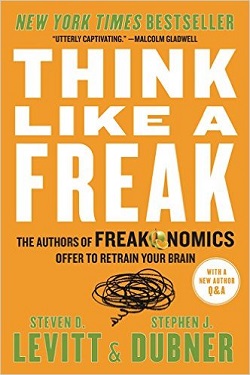 Think Like a Freak by Steven D. Levitt and Stephen J. Dubner, 2015, by HarperCollins. Available in hardcover, paperback, Kindle, and audiobook formats. I highly recommend the audio version, which is read by Dubner.
Think Like a Freak by Steven D. Levitt and Stephen J. Dubner, 2015, by HarperCollins. Available in hardcover, paperback, Kindle, and audiobook formats. I highly recommend the audio version, which is read by Dubner.
Visit the authors’ website at freakonomics.com to access an enormous trove of material, including their podcast episodes going back to 2010. Just about any subject you can think of is probably in those archives somewhere.
If you haven’t already done so, you should read Levitt and Dubner’s two previous books, Freakonomics and Super Freakonomics. All three of these books deal with the way that human beings respond to incentives. Conventional economics says that people respond in a rational way and that therefore market forces are also rational. “Enlightened self-interest” will always win the day, we’re told, thus leaving everyone better off. If only that were true! What is true is that the law of unintended consequences always rises up to bite us. We think we’ve set up a great system, but only after it’s running do we see how it really
works. So Levitt (or Dubner) tells a very funny story about toilet-training his daughter, who had been doing very well but then relapsed and started having accidents. What to do? The incentive-minded father told her, “Every time you use the potty I’ll give you a bag of M&M’s.” (A bag? We’ll hope it was a small one.) Everything went fine until the daughter figured out how to game the system, visiting the bathroom several times an hour and demanding candy every single time. Alas, the scheme had backfired. (I don’t remember exactly how the father resolved the problem; one drawback to audiobooks is that it’s very difficult to go back and find a passage.) There’s story after story in the larger arena about misguided incentives; if ever you doubted that man has a sin nature, just reading these examples should convince you. So, in the area of pollution, if you give manufacturers a bonus for discontinuing the use of a dangerous chemical, guess what some of them will do? Why, they’ll first of all start using the dangerous chemical, so that they’ll get paid for not using it. The last state is worse than the first.
If you were to choose just one chapter to read or listen to from this book, though, you’d be wise to pick “How to Persuade People Who Don’t Want to Be Persuaded.” Probably the most useful tip in this material (other than the obvious one that insulting people rarely persuades them) is that nudging, one little tidbit at a time, is far more effective in the long run than the big statement that contradicts everything the persuadee believes. I am so bad at this! I want to just tell people what they should believe, open up their heads and pour in my pearls of wisdom, and send them on their way saying, “Wow, my whole worldview has been changed!” Now, come on. Has that ever happened to you? I’ll bet not. Our mindsets are like rubber bands: stretch them too far and they snap back. I’ve probably made at least some people believe more strongly in their misguided views after I’ve unloaded my bombs than they did before. As we progress, if that’s the word, farther into the contentious 2016 campaign, with tempers flaring and horns blaring, I need to remember the sterling advice in this book.
It’s occurred to me, by the way, that becoming angry when others disagree with you is a sure sign of your own insecurity. You feel personally attacked and respond in kind. If you’re confident, on the other hand, then you have nothing to prove and nothing to lose if others disagree with you. Your concern is for your listener, not for yourself. The other side of the coin is also true: if you’re afraid of others’ disapproval or contempt, then you won’t speak up because you don’t want to look bad. Either way, you’re displaying self-centeredness instead of humility. Interesting that a central lesson in a book about economics incentives doesn’t actually have anything to do with that subject! Only when you’re focused on others can you engage with them thoughtfully and meaningfully.
I’ve read Freakonomics and loved it, now I’ll have to read this one too!